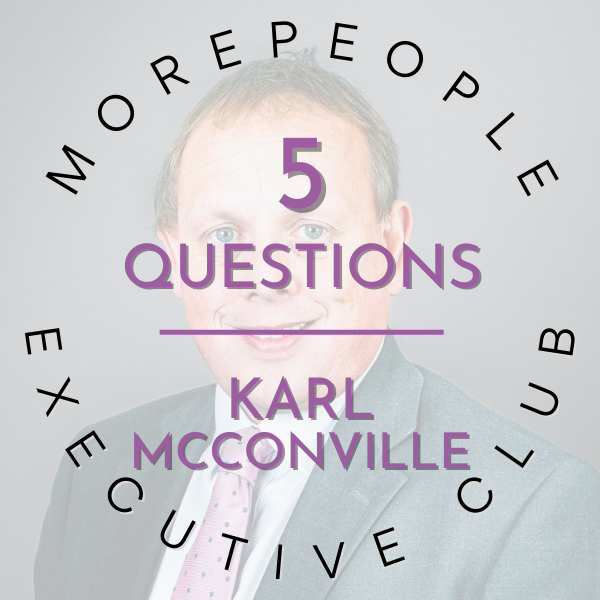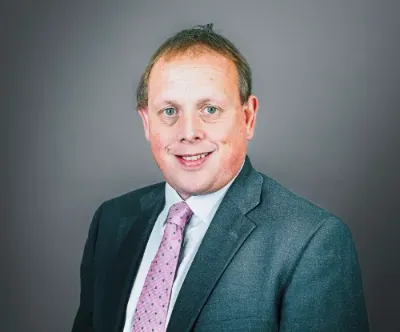
MorePeople 5 Questions - Karl McConville
Next up in our 5 Questions series, Deputy Head of Rural at Strutt & Parker and Senior Director for BNP PARIBAS, Karl McConville!
Some great insight and answers from Karl, thanks for taking part!
What's the single biggest challenge facing our industry today?

In order for farmers to make a living and thrive in the coming zero subsidy environment, the rural sector needs to better collaborate by building a culture where landowners learn more from each other. This approach is not part of land management DNA, yet.
Traditional landed estate owners are on the verge of a significant opportunity from environmental and social payments, but the best returns will come when applied at a landscape scale and this will need landowners to collaborate and cooperate.
I believe a wider cooperation will bring a strength in buying and selling commodities, as well as the opportunity to share equipment and people but also ideas and information. This sharing of information will increase the change of pace and ensure that margins increase and our clients thrive, not just survive.
What do you think the next big product / piece of tech will be?
Without a doubt in the area that I work in, Land Management, the next big thing will be the use of land to support the ESG and Net Zero objectives of corporate institutions. There are so many opportunities in this area from biodiversity net gain, nutrient neutrality, and carbon offsetting through afforestation, peatland restoration and incoming soil carbon.
Renewable energy equally continues to be an opportunity with corporates acquiring ‘power purchase agreements’ (PPAs) to secure their electricity supply, biomass for heating, habitat restoration, water management, landscape recovery, rewilding and so much more.
At the same time there is a real challenge with the social impacts of this change in land use. It is easy to buy up large areas of land and plant trees or rewild it, however corporates need to understand the potential impact this could have on local communities, businesses and people.
If the approach is correctly balanced with these considerations in mind, there are opportunities to really support local communities, be that through tourism, value add from local products, or use of redundant buildings for residential or commercial uses.
What do you like most about our industry?
The people I work with and the passion they have for the rural industry. I am fortunate to work with fantastic clients who are, in the majority family based businesses, and they are constantly striving to do their best for the farm or estate. In no other industry would someone come back to work at 10pm (knowing they are up at 4am) to check on the health of a baby calf. This mind-set means you get to work with people who are the most genuine I have ever worked with and I am fortunate to have made many good friends over the years.
What was your first ever job in our industry?
My first job in the sector was a farm worker during school holidays! I remember it was quite basic, sleeping in a two-man tent, but with access to the farmhouse for food and ‘stuff’. I learnt so much about the industry during those holidays, from practical farming, milking cows, dipping sheep, making hay, harvesting corn and baling straw.
The experience also taught me that land is not always used for farming. The farmer, Mr Fuke who was a tenant, had diversified some of the land to a caravan site. It was fascinating to see how he secured a separate income stream, while I also learnt how to deal with people on the site.
My biggest takeaway of that first job was how Mr Fuke gave back to someone keen and interested in the sector. I try to ‘pay that forward’ today, and give back where I can. For example, I do talks to local primary and secondary schools on careers in agriculture and lots of mock interviews for students from around the country. We should all remember the difference we can make on the future of young people we interact with.
What piece of advice would you like to give to your 21-year-old self?
I much prefer to look forward and see the future as it can be. However, if I look at the advice I have been given on my journey to where I am today, I wish my 21-year old self had known these four things at the time:
•Do the unpalatable and difficult jobs as soon as you practically can. We all worry about these tasks, we imagine doing them and then re-run how it went, we imagine the worse possible outcomes. Don’t waste that emotional energy and just get on with the task. The outcome is always fine, and you learn so much on the way.
•Make time for you and your family and friends. Prioritise that time and treat it as strictly as you would a client meeting. Never miss a school play or parents evening as you won’t get those back!
•Don’t be scared of ‘No’ or disagreeing. People will respect you more for standing up for your views.
•Be confident in who you are and in your abilities. We are judged on what we do and how we did it. If you work hard, with ambition and consideration for others, there is no reason to doubt yourself, or compare yourself to others.
